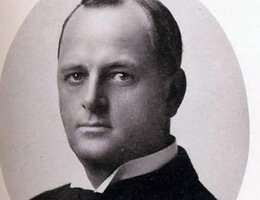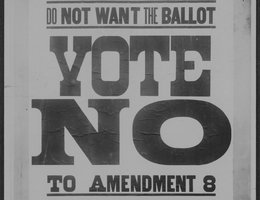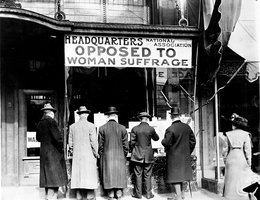

There were also religious figures who joined the fight to keep women out of the voting booths. After all, some of them argued, women did not belong in the political arena because their place was the:
". . . realm of sentiment and love, gentler, kinder and holier attributes, that make the name of wife, mother, and sister next to the name of God himself."
The Roman Catholic Church was the religious group that most consistently opposed women’s suffrage. In 1906 more than 29% of all Nebraskans claimed affiliation with the Catholic Church, by far the largest single denomination in the state. German Catholics were the most conservative and opposed most of the progressive era reforms, especially any attempts to provide women access to the ballot box or prohibit the sale of alcoholic beverages.
Yet, there were some Catholic voices in favor of suffrage. In 1914, the national president of the pro-suffrage organization, Dr. Anna Howard Shaw, was in Omaha. Her speeches prompted a few Catholic priests to express their personal support for suffrage.

That act prompted the Nebraska chairwoman of the anti-suffragists, Mrs. Mary Nash Crofoot, to distribute a pamphlet called "Lest Catholic Men Be Misled" to churches around the city. The pamphlet was actually authored by her husband, L. F. Crofoot, but distributed under her name. They argued that feminists were opposed to the standard that the Virgin Mother set for "ideal womanhood". And they argued that Socialists in this country supported suffrage and opposed Catholics.
"All socialists are opposed to anything Christian, but they bitterly hate and attack Catholics. Why should Catholics join themselves with such a body?"
Adolf Hult, an early 20th century Lutheran pastor claimed that "Suffragism [is] Gripped by Feminism". He said that the suffrage movement had been taken over by "lust and immorality". He feared that the fall of women would lead to the fall of the world. "Must men put on the iron glove?" he asked.
The Reverend John Williams of St. Barnabas Episcopal Church made a distinction between the mainstream suffragists and the radical fringe. Nonetheless, he argued that the more moderate element of the movement failed to limit the excesses of the radicals who were undermining Christian morality, marriage, and home life, the Victorian ideal that a woman’s place was in the home as preordained by God.
"God meant for women to reign over home, and most good women reject politics because woman suffrage will destroy society."
And a minister from Ponca, Nebraska quoted scripture and said that God simply forgot to list one more commandment — women shall not vote.

The first organized male opposition to the Nebraska suffragists, like the female group, came from Omaha. In 1914, the Nebraska Men’s Association Opposed to Woman Suffrage (NMAOWS) was organized. They published a document in 1914 expressing their reasons for opposing women’s suffrage:
"Franchise [the right to vote] is a privilege of government granted only to those to whom the government see fit to grant it."